With all the craziness happening in the world around us, I am so thankful that we decided to homeschool.
These days, there has been more interest in homeschooling (which I think is awesome) and with that comes plenty of homeschooling questions. I’ve been getting more and more messages from my beloved readers about things like: “How do you do it? How do you run your businesses, homestead, and still find the time to homeschool 3 kids?”
It is no secret that I am a big believer in planning and it is a super important part of my life that allows me to do so much, including homeschooling my kids.
My love for planning is part of the reason that I created The Old Fashioned on Purpose Planner. It’s my secret weapon for getting everything done on the homestead.
I’ve talked before about how to organize your homestead with a planner. The homeschooling aspect of our life is no different; I create a plan for it and I use my planner to fit our homeschooling routine into our homesteading way of life.
Of course, you don’t HAVE to use the same type of planner that I do. But I do strongly recommend using some sort of planner to organize your homeschool curriculum, your school routine, and all the other aspects that you need to keep organize in order to efficiently homeschool your kids.
If you need some more inspiration about homeschooling, make sure you check out my other articles and podcast episodes here:
- Our First Year of Homeschooling
- Homestead Homeschooling: Year 2
- Homestead Homeschooling: Year 3
- Our Current Homeschool Curriculum (podcast episode)
- What If My Kids Fall Behind?? (And other Homeschooling Questions) (podcast episode)
Before you jump right into planning your homeschool year, if this is all new to you, there are some things that you should take into consideration.
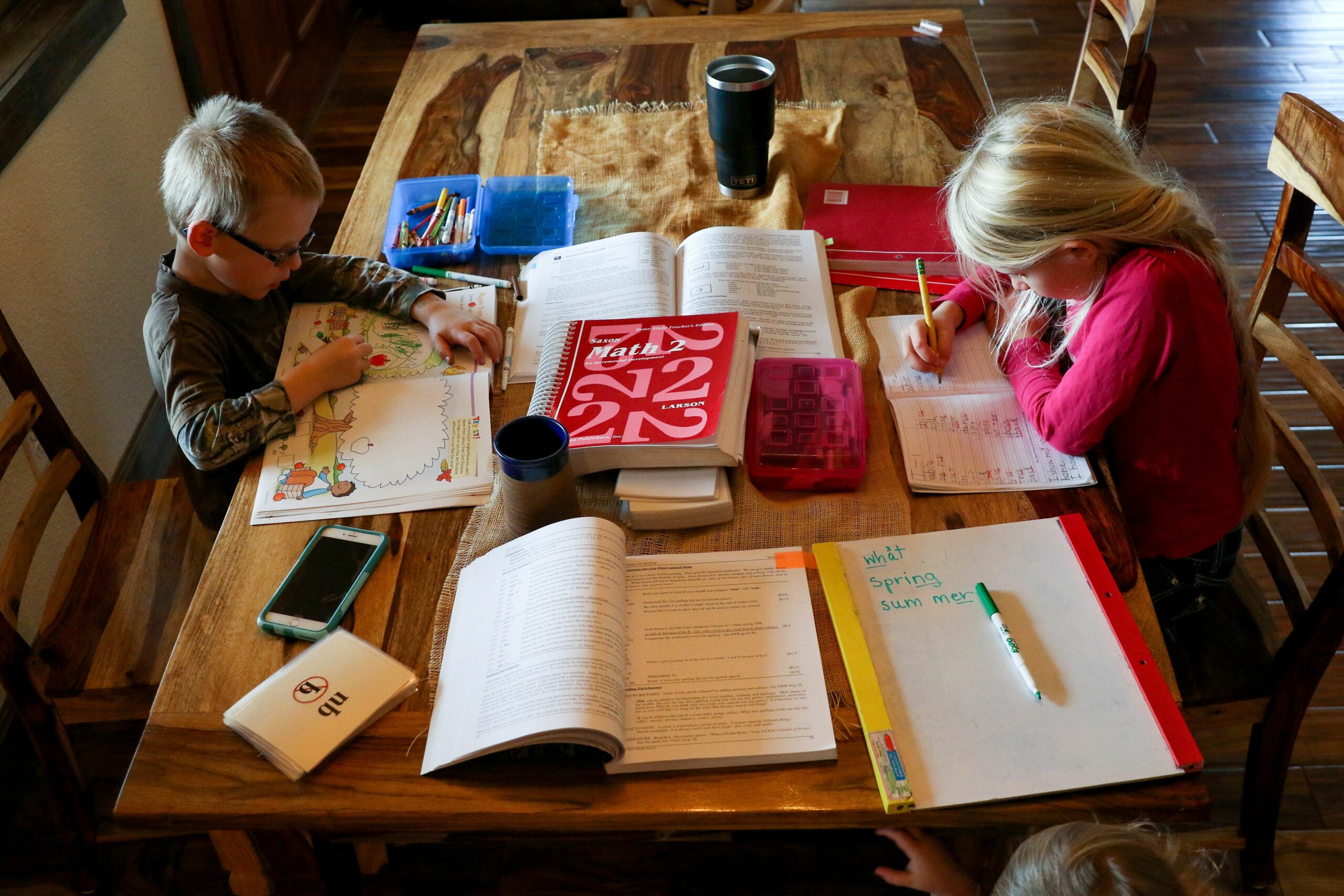
Things to Consider Before Planning Your Homeschool Year
1. How Much Time to Set Aside When Planning Your Homeschool Year
Homeschooling can be a bit overwhelming, especially when starting out as a newbie. You will want to make sure that you are able to set aside the amount of time needed to accomplish your daily goals. This can depend on your child’s learning pace and you should also make sure you also allow some extra time for some flexibility.
Younger children tend to need more one-on-one time than older more independent kids. For example, last year I had a kindergartener that needed more attention. I quickly learned that it was easier to start the older two first. While the other two moved on to their reading, I started the kindergarten lesson.
2. The Number of Kids and Different Learning Styles
Homeschooling one child is completely different than homeschooling three kids, and obviously, it is much easier to plan for one child’s needs. With each additional child, your homeschooling plan may have to be altered from the previous year.
Plus, most kids learn in different ways from each other, and different learning styles mean that you won’t be able to easily recycle curriculum from year to year. Each child is different and what works for one may not work for the others.
3. Each Child’s Grade Level
I am a huge fan of the one-room schoolhouse method, which is when multiple grade levels use the same curriculum and get something different out of the lesson based on that level. It is more of a community-minded learning experience. However, this type of teaching method may not work for all especially if you are homeschooling kids with big grade gaps.
You will need to consider the level and the age gaps when you are planning your homeschool year for each individual child.
4. Your Teaching Style
We all know that kids have different learning styles and there are also different homeschool teaching styles. Some of the well-known homeschool teaching methods include Unschooling, Charlotte Mason, Montessori, and Classical.
Before you start planning your homeschool year, you will need to decide which method or methods (you can mix and match) is right for you and your kids. You can learn more about each homeschooling method by reading this article I found: Homeschooling: Which Model is Right for You?
5. What Do You Feel is Important for Your Kids to Learn
This doesn’t just apply to what curriculum you are choosing, it also means what skills, ideals, and life lessons you feel are important for your kids to take away from this year. For example, I’m Teaching My Kids to Fail because I believe that this is an important life lesson that will help them build a stronger future.
I’m also pretty passionate about having my kids learn life-skills through activities like: homesteading chores, helping with the cooking, learning basic carpentry, doing 4-H activities, and other responsibilities around the home that are helping them learn many important skills and life lessons.
Once you have considered these things and what you believe your homeschool year should look like, then you can start physically planning it. Below are 6 tips that I believe will help you plan your homeschooling year.
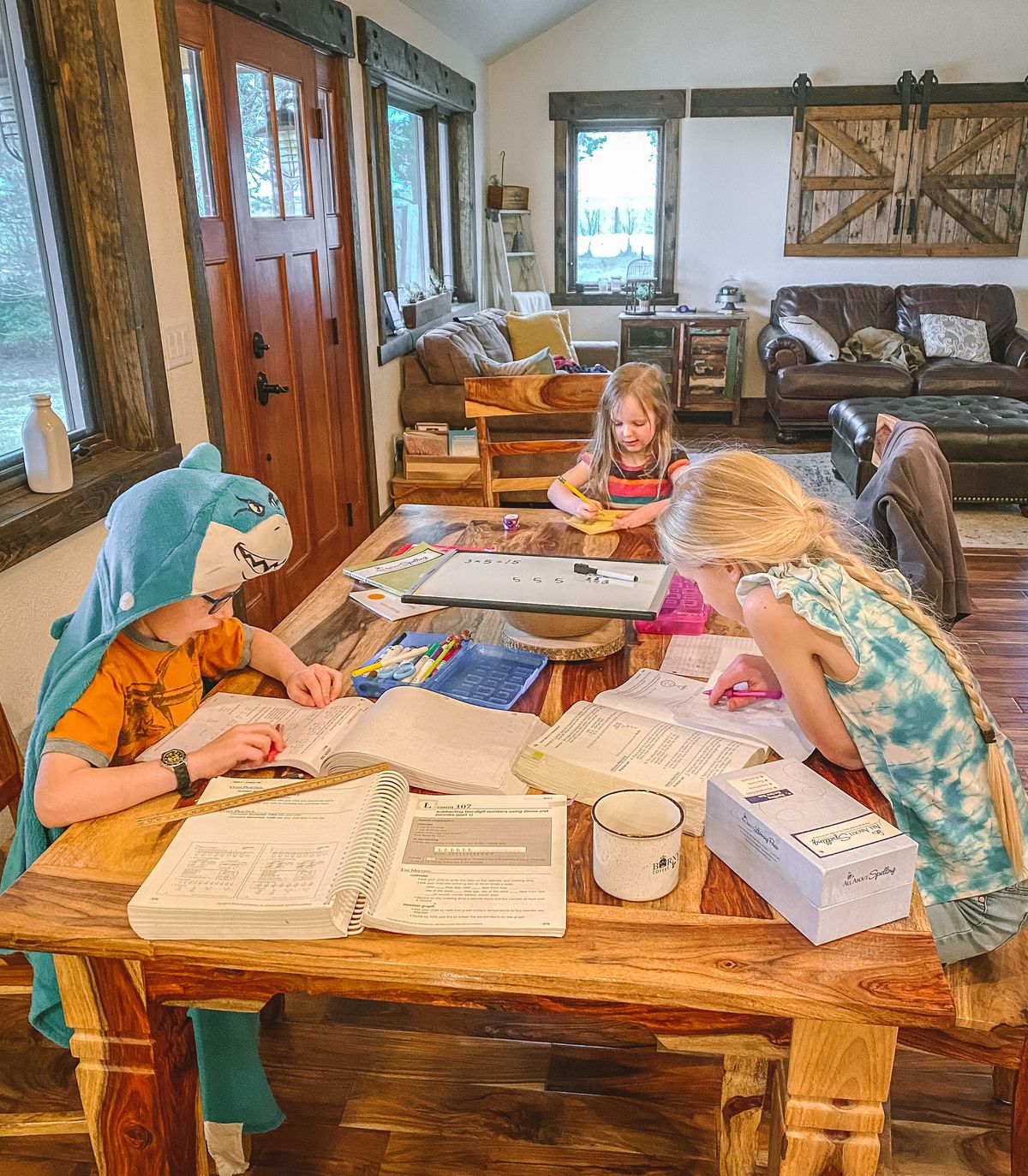
6 Tips for Planning Your Homeschool Year
Tip #1: Plan Your Goals for the Year and for Each Child
What do you hope your children take away from this homeschooling year? It is a good idea to set goals for your overall year and for each child you are teaching. Remember when you are setting goals be realistic. It is ok to set goals that are challenging but remember to keep them within reach.
Tip #2: Decide on Your Homeschool Schedule and Routine
You will want to plan your homeschool year based on a schedule and routine that fits into your lifestyle. Make sure that they work for you and not against you. Our routine starts at 8 am, but yours can start at whatever time works for you and go as long as you need it to. For example, you can plan a normal 8-to-3 schedule or get schooling out of the way before lunch.
No matter what your routine, try and stick with it as best you can. If you are just starting out it will take some adjustment time and don’t be afraid to change it up if it’s not working.
Tip #3: Choose Your Curriculum
There are a lot of different curriculums out there for homeschooling and many are based on different homeschooling models. You will want to choose the curriculum that works best for both your child’s learning style and your teaching style.
Each curriculum will require you to plan and prepare for each lesson, and you will need to decide how much time you want to spend preparing. Personally, I don’t like a curriculum that requires days of prep to teach one lesson; I feel like the simpler it is, the better it usually is for everyone.
If you’d like some curriculum inspiration, check out my podcast episodes here:
Tip #4: Planning Your Homeschool Year Ahead of Time with Flexibility
Look at the year ahead of you, do you have any planned vacations or busy life events? It is ok to plan ahead for these kinds of things. For me, it could be a Homesteaders of America event or a family trip out of town (which could be considered a learning field trip). Plan your homeschooling year with these things in mind.
When you are planning your homeschooling lessons, I would recommend planning a few weeks at a time. Things happen and you may not get to each lesson you planned on time, only planning so far out gives you a little more room to be flexible.
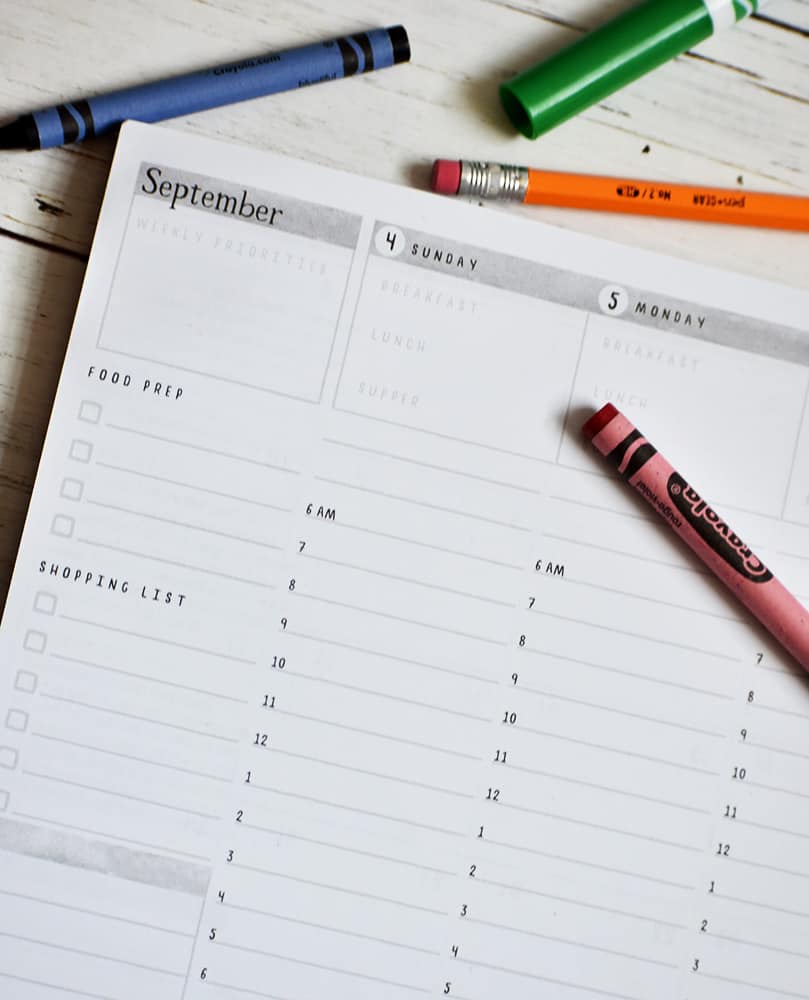
Tip #5: Use a Planner for Organizing Your Homeschool Year
As I mentioned earlier, I am a huge fan of using a planner to keep my life organized. I like to use a planner that has a weekly spread with the days broken down into hours of the day. This allows me to time block for lessons and visually see how the day is going to go.
This keeps everything in order and allows us to stay on track while we are completing our daily homeschool routine. Of course, just because it is written down doesn’t mean that it is set in stone, because I firmly believe that homeschooling is also about flexibility. Trust me, things will not always go as planned.
Tip #6: Organize Your Space, Learning Materials, and Supplies
When I first started homeschooling, we didn’t really have a designated homeschooling space and it is ok if you don’t either. Just make sure that your materials and supplies are organized and ready to use when you need them. It really helps when you are trying to move from one lesson to the next.
You do not want to be trying to go over a lesson and scrounging for things, because this is a good way to lose the kids’ interest and disrupt the routine.
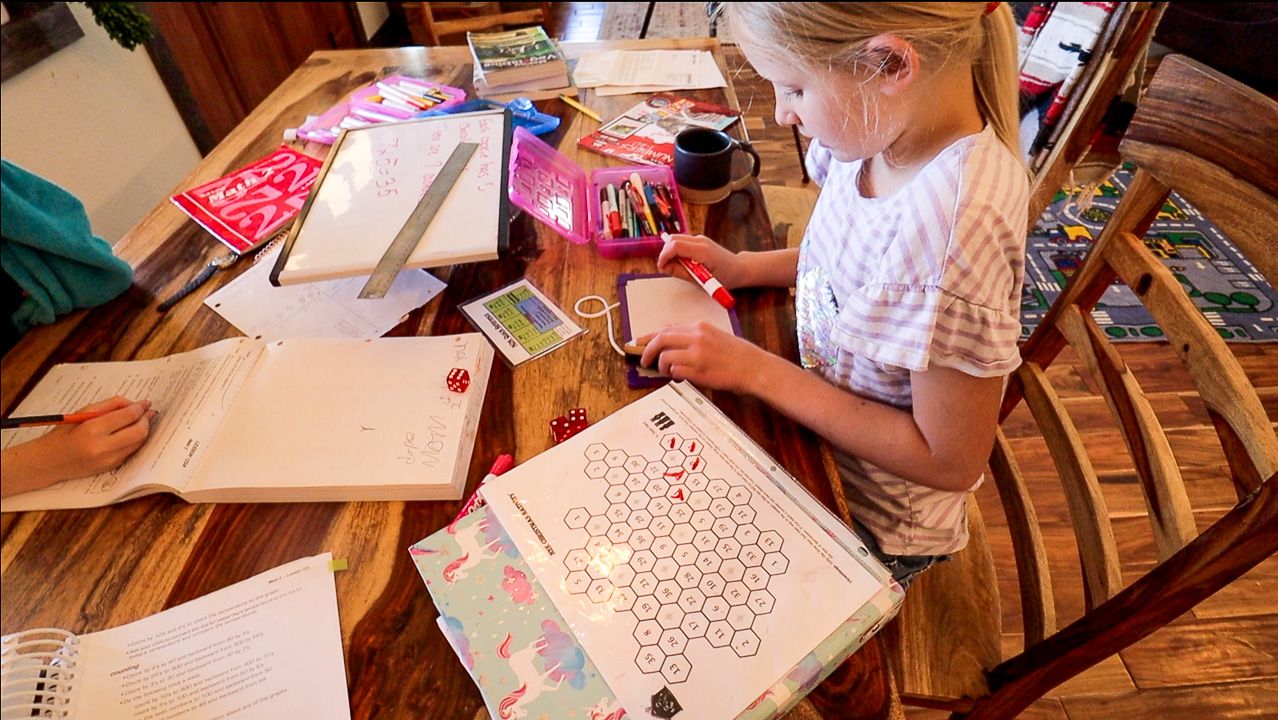
Are Your Ready to Start Planning Your Homeschool Year?
Homeschooling can be nerve-racking and a bit overwhelming in the beginning. Planning your homeschool year will help you be organized instead of overwhelmed. Try these tips to help plan your upcoming homeschool year.
I think it is great that so many folks have now decided to homeschool their kids and become more independent from modern systems that just aren’t working very well these days.
More About Raising Homestead Kids:
- Homesteading With Kids: How We Do It
- Will My Kids Fall Behind? (And Other Homeschooling Questions)
- Raising Old-Fashioned Kids in a High Tech World
- 7 Lessons My Kids Have Learned from Homestead Life
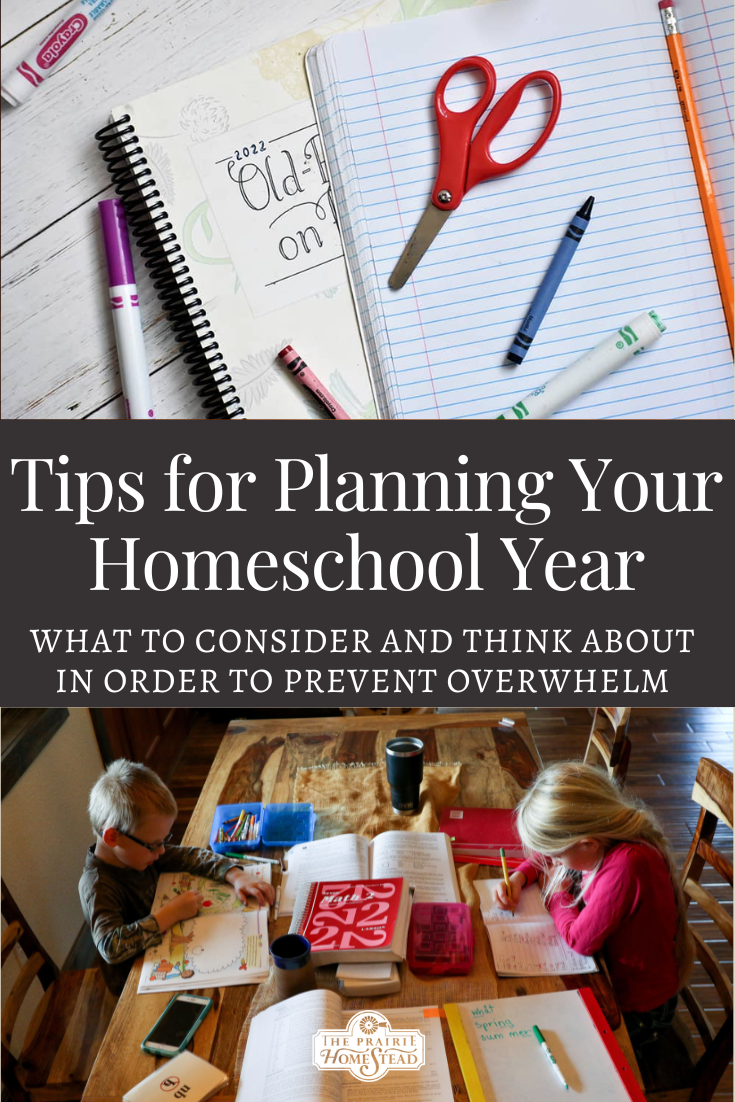
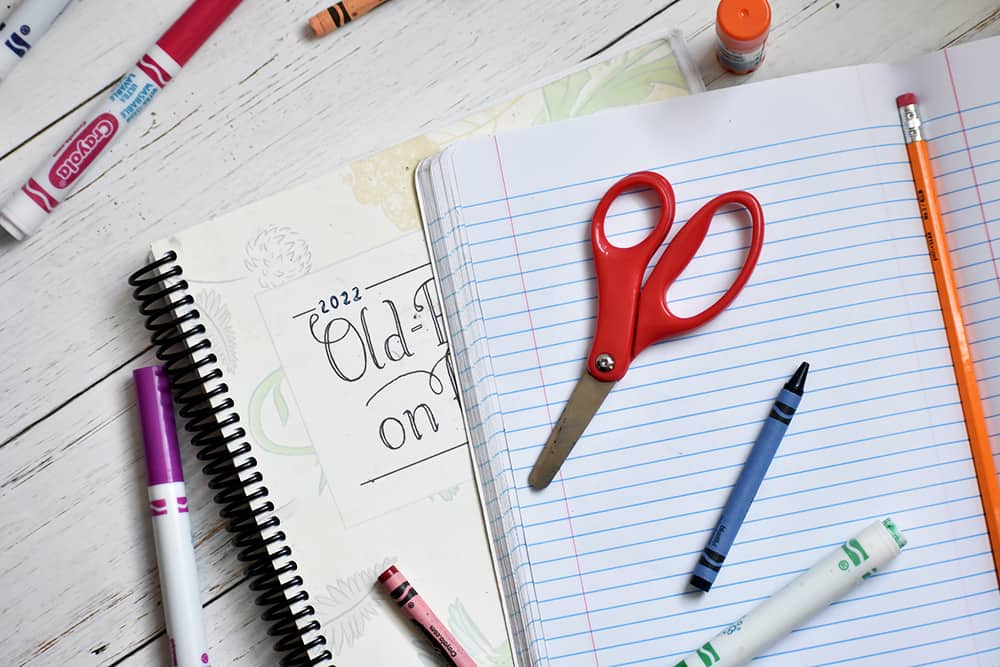

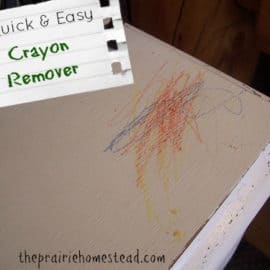



I wish I had been home schooled. I always felt like I was waiting for the rest to catch up, especially in grade school. It made learning boring for me and I would daydream while waiting. Some others turned that waiting time into things that got them into trouble for disrupting the class.
Later when I went to a private school, they focused on teaching you how to teach yourself – like how to use the library indexes to search for whatever you were looking for (old school, I know) but the same applies now to internet searching. What good is it to do a search and get 1,000’s of hits? Teach them how to use quotes for an exact phrase or a minus sign in front of a word to eliminate it from the search and pare down the results. Another trick for memorization is to ‘Read it, say it, write it’ – that burns a synapse quickly to commit things to your memory banks.
Kudos, Jill for taking the home schooling route. You are in control of what, when and how your kids learn. When something fun, interesting or important comes up, you can just say ‘School’s closed today!’ and you can go do it with them. That togetherness will keep your family bonded forever.
Great post